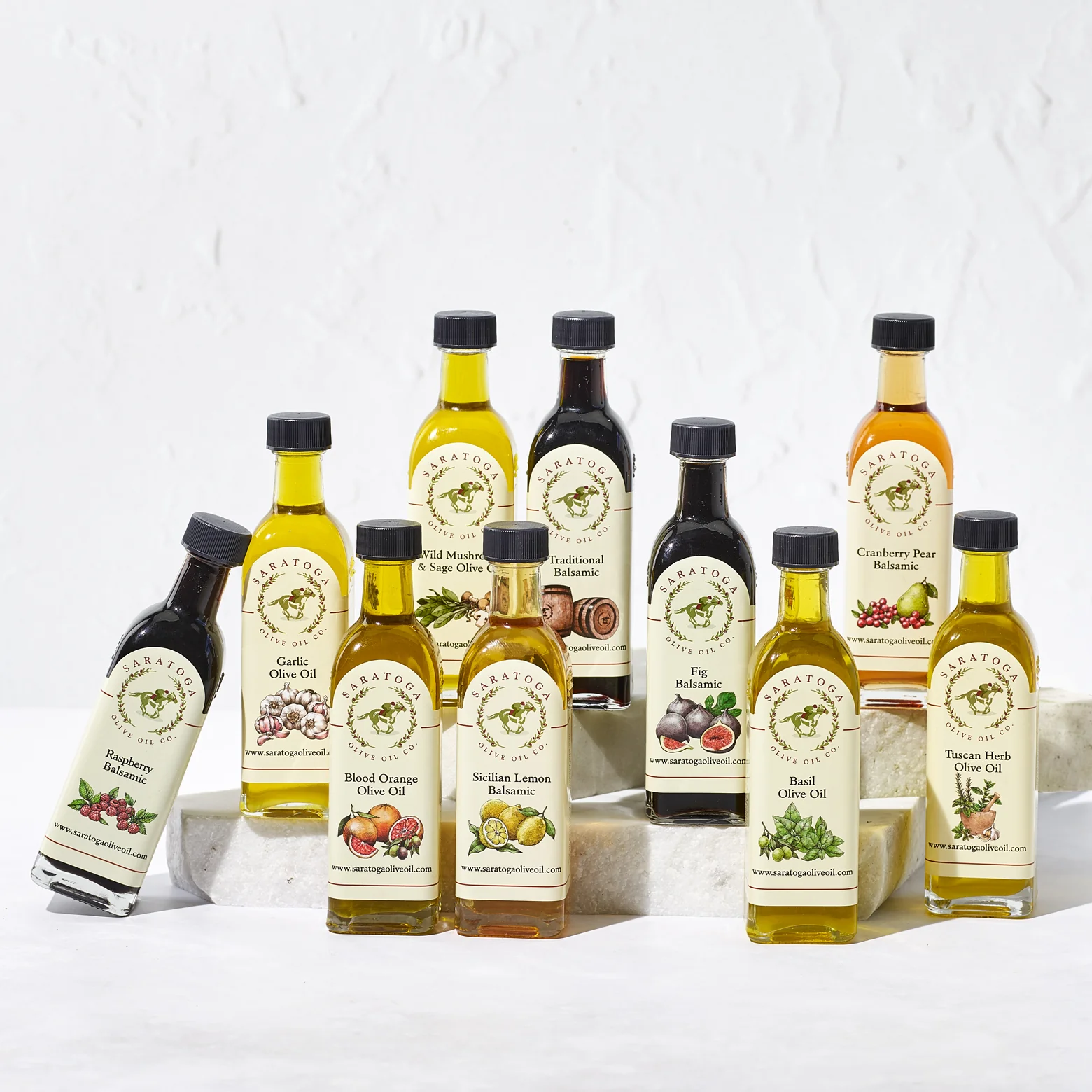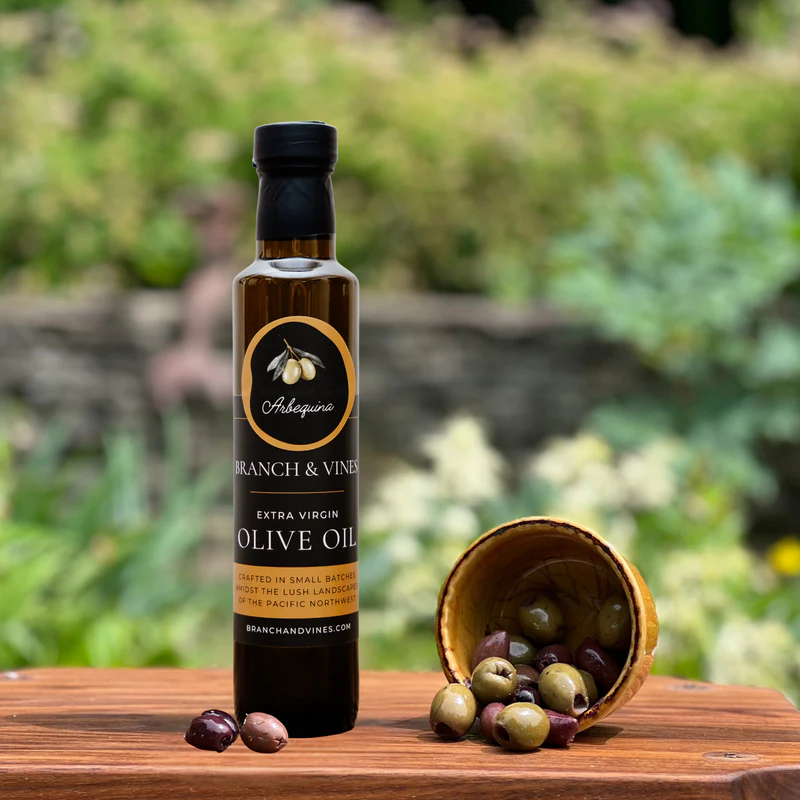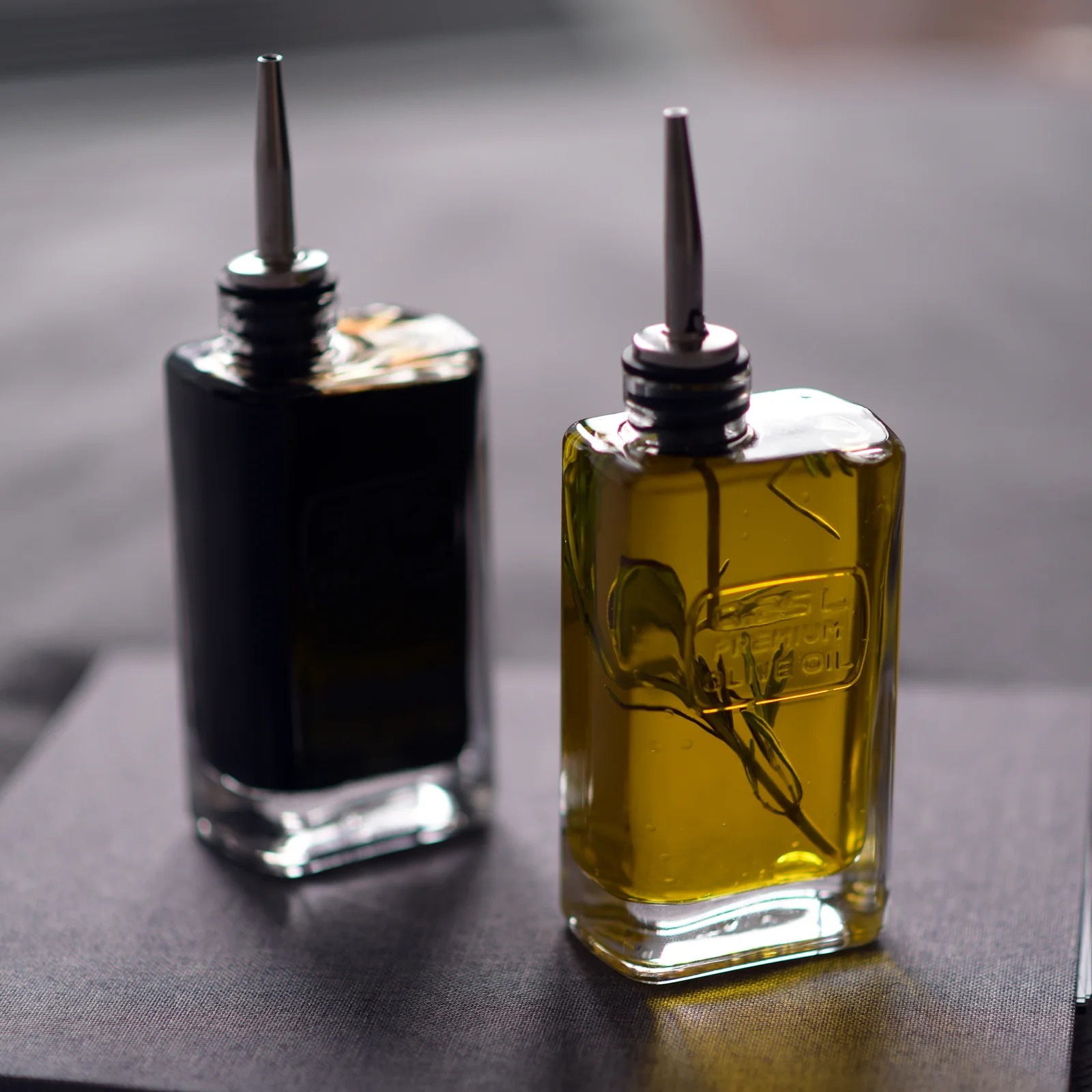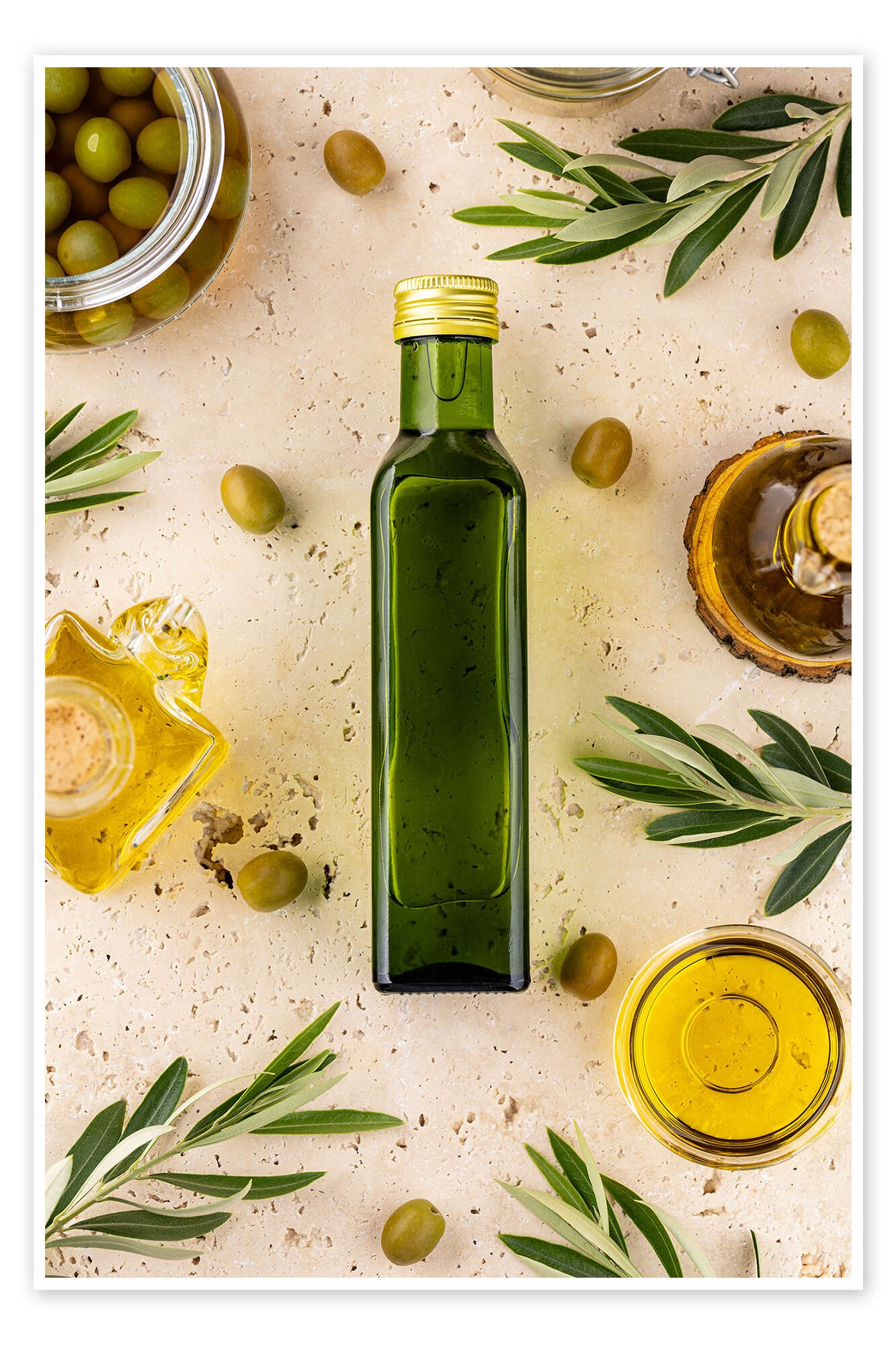Olive oil is sensitive to three things: oxygen, heat and light. When any one of them is too high, the oil loses the very compounds that give it aroma, fruitiness and peppery finish. Packers therefore choose a container that slows these reactions down without adding new problems. Among the options—plastic, metal, coated cartons and glass—glass is the only material that is chemically inert, completely impermeable to both air and moisture, and transparent enough for consumers to inspect colour and clarity. Those properties make it the default reference for long-term quality, and the reason most premium labels are still sold in glass.
Why Your Olive Oil Belongs in a Dark Glass Bottle
If you’ve ever wondered why high-quality olive oil almost always comes in dark green or amber glass bottles, there’s a good science-backed reason: light is olive oil’s number one enemy. Exposure to light—especially UV rays—triggers a process called photo-oxidation, which degrades the oil’s flavor, aroma, and nutritional value over time.
How Light Spoils Olive Oil
When light penetrates the bottle, it breaks down important compounds like polyphenols, vitamin E, and chlorophyll. These are the elements that give extra virgin olive oil its distinctive taste and health benefits. Without protection, the oil can turn rancid much faster, losing its fresh, fruity notes and becoming dull or bitter.
Interestingly, chlorophyll—the natural pigment that gives some olive oils a vibrant green color—also makes the oil more sensitive to light. That means the very thing that signals freshness can actually speed up spoilage if the oil isn’t stored properly.
Why Dark Glass Works Better
Dark glass bottles (green, amber, or brown) act like sunglasses for your oil. They filter out most harmful UV and visible light, slowing down oxidation and helping preserve the oil’s quality. Compared to clear glass or plastic containers, dark glass offers significantly better protection—extending shelf life and keeping antioxidants intact.
Studies have shown that olive oil stored in dark glass or opaque tins can maintain its extra-virgin quality for at least six months when kept at room temperature. In contrast, oil in clear bottles may show signs of nutrient loss and flavor degradation in as little as 150 days, especially under bright store lighting.
What the Research Says
Oils packaged in dark glass or metal containers retain higher levels of polyphenols and vitamin E over time. One 2021 study highlighted that oxidation levels were noticeably lower in dark glass compared to clear glass after five months. While opaque metal tins offer the best light protection, dark glass remains a practical and effective choice for most consumers.
Quick Comparison Table
|
Feature |
Dark (Opaque) Glass Bottles |
Clear Glass Bottles |
|---|---|---|
|
UV/Light Protection |
Excellent |
Poor |
|
Shelf Life Extension |
Longer (up to 6 months) |
Much shorter |
|
Nutrient Retention |
Keeps antioxidants, vitamin E |
Rapid nutrient loss |
|
Sensory Quality |
Remains stable |
Flavor/aroma degrade |
|
Photo-Oxidation Risk |
Minimal |
High |
Simple Tips for Keeping Olive Oil Fresh
-
Always choose olive oil in dark glass bottles when possible.
-
Store the bottle in a cool, dark cupboard—not on the counter or near a window.
-
Avoid transferring oil to clear or plastic containers for long-term storage.
-
Use the oil within a few months after opening for the best flavor.
It’s no coincidence that premium olive oil producers rely on dark glass packaging. It’s a simple but effective way to protect your oil’s delicate characteristics and make sure every drizzle tastes the way it should—fresh, flavorful, and full of goodness.
Keeping Your Olive Oil Fresh: A Simple Guide to Clean Glass Bottles
There’s nothing worse than reaching for your favorite olive oil and noticing an off smell or taste. Often, the problem isn’t the oil itself—it’s the bottle. Reusing glass bottles is a smart and sustainable practice, but leftover oil residue can spoil your next batch. Here’s how to keep those bottles sparkling clean and odor-free.
Why a Clean Bottle Matters
When oil sits in a bottle, it can leave a sticky film that turns rancid over time. This not only affects the flavor of fresh oil but can also introduce bacteria. A 2024 survey even found that more than half of home cooks reuse their olive oil bottles, making proper cleaning essential for both taste and hygiene.
Easy, Effective Cleaning Methods
You don’t need harsh chemicals to get your bottles clean. Here are a few reliable methods using common household items:
-
The Dynamic Duo: Baking Soda & Vinegar
Mix two tablespoons of baking soda with one cup of white vinegar to create a foaming paste. Use a soft bottle brush to spread it inside the bottle, paying extra attention to oily areas. Rinse thoroughly with warm water and let it air dry. This combo cuts through grease naturally and works well on bottle nozzles too—just use a cotton swab for hard-to-reach spots. -
Lemon and Salt Scrub
For stubborn residue, try mixing ¼ cup of coarse salt with two tablespoons of lemon juice. Spread the paste inside the bottle and let it sit for 15–20 minutes. The acidity from the lemon helps break down oil, while the salt acts as a gentle abrasive. Rinse well afterward—no soapy aftertaste guaranteed. -
Hot Soapy Soak
Sometimes the simplest method is the best. Fill the bottle with hot water and add a teaspoon or two of unscented dish soap. Let it soak for 30–60 minutes, then scrub with a brush. Be sure to rinse thoroughly and dry completely to prevent water spots or musty smells. -
Rice + Vinegar Shake
Great for bottles with narrow necks! Pour in ½ cup of uncooked rice and one cup of vinegar. Seal the bottle and shake vigorously for a few minutes. The rice acts as a gentle scrubber, loosening residue that brushes can’t reach. Rinse well and repeat if needed.
Dealing with Tough Stains or Odors
For dried or hardened oil, fill the bottle with warm water and add a splash of vinegar or a spoonful of baking soda. Let it sit overnight before scrubbing. If a funky smell lingers, increase the amount of vinegar in your cleaning solution and repeat the process.
Smart Storage Tips After Cleaning
Always air-dry bottles completely before refilling. Moisture can lead to mold. For bottles with flip-top lids or sprayers, disassemble the parts before washing and make sure they’re fully dry before reassembling. Store your clean, filled bottles in a cool, dark place to preserve the oil’s quality. A little effort in cleaning goes a long way in keeping your olive oil fresh and flavorful. Plus, it helps you get more life out of your favorite glass bottles—good for your kitchen and the planet.
Give Your Olive Oil Bottles a Second Life: The Eco-Friendly Guide
We all love a beautiful glass olive oil bottle, but what happens after the last drop is gone? Thankfully, glass is one of the most sustainable packaging materials—100% recyclable and able to be reborn again and again without losing quality. Here’s a closer look at why recycling your olive oil bottles matters, and how small habits can make a real difference.
Glass Recycling By the Numbers
Glass recycling rates vary widely around the world, and there’s plenty of room for improvement: In the U.S., only about 31% of glass containers are recycled—meaning billions of bottles still end up in landfills each year. Europe leads the way, with countries like Germany and Sweden recycling over 90% of their glass. Australia turns about 85% of collected glass back into new bottles and jars, showing a strong circular economy in action.
Recycling glass isn’t just about reducing waste—it’s highly efficient. Did you know a recycled glass bottle can be back on a store shelf in as little as 30 days? Or that one tonne of recycled glass can produce 4,000 new bottles?
The Environmental Impact: Why Every Bottle Counts
When glass isn’t recycled, the consequences add up: Glass takes thousands of years to break down in a landfill. In the U.S. alone, discarded glass bottles and jars could fill two Empire State Buildings every three weeks. While glass is recyclable, it’s also heavy and can be costly to transport. Broken glass in mixed recycling bins may also contaminate other materials. Still, the benefits of recycling far outweigh the challenges. Using recycled glass (called “cullet”) lowers the energy needed to make new bottles and reduces raw material extraction.
How Olive Oil Brands Are Stepping Up
Many producers are making changes behind the scenes to lighten their environmental footprint: Bottle designs are becoming lighter and more efficient, using less glass without compromising strength. Some brands encourage bulk purchases—one large bottle uses less glass and energy than several smaller ones. While glass production does generate emissions, its ability to be endlessly recycled—and to protect olive oil’s delicate flavor—makes it a preferred choice for quality-conscious brands.
What You Can Do
-
Recycle right: Rinse bottles before recycling to avoid contamination.
-
Choose wisely: Support brands that use recycled glass in their packaging.
-
Buy in bulk: Reduce glass waste by selecting larger bottles when possible.
-
Spread the word: Share recycling knowledge with friends and family—awareness drives action.
Recycling your olive oil bottle is a simple gesture with long-term benefits. It keeps glass in the recycling loop, protects natural resources, and supports a system that values quality and sustainability. So next time you finish a bottle, remember—it’s not the end. It’s the start of something new.
Summary
Choosing glass is choosing to protect the delicate flavor, aroma, and integrity of premium olive oil. Its impermeable nature and superior light-blocking capabilities are unmatched by other materials, ensuring that every drop reaches your table as the producer intended. While glass is the clear winner for preservation, its quality matters just as much.
At TP Glass Bottle, we specialize in crafting high-performance, custom glass bottles designed to meet the exact needs of olive oil artisans and brands. From rich, UV-protective amber and green glass to elegant designs that reflect your quality, we provide the perfect first line of defense for your product. Partner with us to ensure your oil is housed in packaging that preserves its excellence from our factory to your customer’s kitchen.





